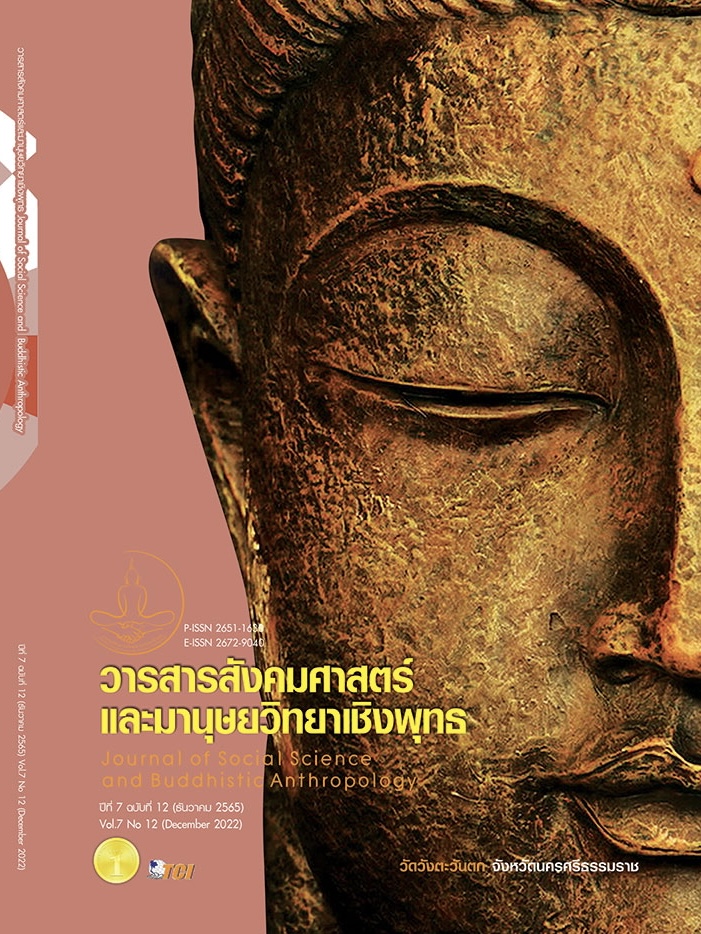COMPETENCY FACTOR FOR ACTIVE CITIZENSHIP COMPETENCIES ENHANCING OF ELEMENATRY SCHOOL STUDENTS
Keywords:
Components of The Active Citizenship Competencies, Active Citizenship Competencies, Elementary School StudentsAbstract
The objectives of this research were to study the components of the active citizenship competencies of elementary school students through the examination and verification of the appropriateness of the active citizenship competencies of elementary school students. This research conducted is quantitative. The samples and the key informant were elementary school students and five experts who evaluated the appropriateness of the active citizenship competencies of elementary school students. The researcher then used the synthesized information and the result from the verified appropriateness of the active citizenship competencies to create the components of the active citizenship competencies. The researcher conducted a content analysis from a literary review and calculated the mean ()and the standard deviation (S.D) of the active citizenship competencies. The results of the studies found that the components of the active citizenship competencies are desirable attributes within elementary school students consisting of the following components: 1) Aspects of knowledge and understanding comprising 1) politics 2) being a good citizen in a democratic manner 3) law and constitution and 4) traditions and culture 2) Aspects of skills comprising 1) critical thinking skills 2) problem-solving skills 3) Aspects of characteristics and attributes comprising 1) the respect of other’s rights and the law 2) having social responsibility 3) having civic participation 4) acceptance of individual differences and 5) having morals and ethics. The results of the appropriateness assessed by five experts revealed that the overall appropriateness of the active citizenship competencies was at the highest level (
= 4.53) which has a significant difference at the 3.50 and above level when compared to the assigned assessment criteria.
References
ชัยอนันต์ สมุทวณิช. (2547). ประชารัฐกับการเปลี่ยนแปลง (พิมพ์ครั้งที่ 3). กรุงเทพมหานคร: สถาบันนโยบายศึกษา.
ถวิลวดี บุรีกุล. (2557). พลเมืองไทย : การสร้างความเป็นพลเมืองในระบอบประชาธิปไตย. กรุงเทพมหานคร: สถาบันพระปกเกล้า.
ทิพย์พาพร ตันติสุนทร. (2555). วิถีไทยกับการเสริมสร้างความเป็นพลเมืองในสังคมประชาธิปไตย. รวม บทความการประชุมวิชาการสถาบันพระปกเกล้า ครั้งที่ 13 ประจำปี 2554 เล่ม 2 เรื่อง ความเป็น พลเมืองกับอนาคตประชาธิปไตยไทย (Citizenship and The Future Of Thai Democracy). เรียกใช้เมื่อ 15 มกราคม 2563 จาก http://www.kpi.ac.th/knowledge/seminar/data/821?page=2
ปริญญา เทวานฤมิตรกุล. (2555). การศึกษาเพื่อสร้างพลเมือง Civic Education. กรุงเทพมหานคร: นานมีบุ๊คส์พับลิเคชั่นส์.
พรอัมรินทร์ พรหมเกิด. (2557). การพัฒนาประชาธิปไตยกับการสร้างวัฒนธรรมทางการเมืองแบบประชาธิปไตย. รัฐสภาสาร, 62(7), 9-43.
มูลนิธิเพื่อคนไทย. (2557). Active Citizenship พลเมืองที่มีส่วนร่วมเพื่อส่วนรวมเปลี่ยนประเทศไทยด้วยตัวเรา. เรียกใช้เมื่อ 15 มกราคม 2563 จาก http:// khonthaifoundation.org/th/active-citizenship/
รัชนี อิ่มอก. (2561). การพัฒนารูปแบบการจัดการเรียนรู้ตามหลักการทรงงานของพระบาทสมเด็จพระเจ้าอยู่หัวรัชกาลที่ 9 เพื่อส่งเสริมความเป็นพลเมืองดีที่ใส่ใจใน สังคม. ใน ดุษฎีนิพนธ์ปรัชญาดุษฎีบัณฑิต สาขาวิชาจิตวิทยาประยุกต์. มหาวิทยาลัยศรีนครินทรวิโรฒ.
วรากรณ์ สามโกเศศ. (2558). ว่าด้วย Active Citizen. เรียกใช้เมื่อ 15 มกราคม 2563 จาก https://thaipublica.org/2015/08/varakorn-125/
ศุภรัตน์ รัตนมุขย์. (2556). รายงานผลการวิจัย การเรียนรู้ด้วยการบริการสังคมกับการสร้างความเป็นพลเมืองใส่ใจสังคม โครงการกองทุนวิจัยสำนักบัณฑิตอาสาสมัคร มหาวิทยาลัยธรรมศาสตร์ ประจำปี 2556. เรียกใช้เมื่อ 15 มกราคม 2563 จาก http://digital.library.tu.ac.th/tu_dc/frontend/Info/item/dc:87040
สำนักงานคณะกรรมการการศึกษาขั้นพื้นฐาน. (2552). หลักสูตรแกนกลางการศึกษาขั้นพื้นฐาน พุทธศักราช 2551. กรุงเทพมหานคร: ครุสภาลาดพร้าว.
สำนักงานคณะกรรมการพัฒนาเศรษฐกิจและสังคมแห่งชาติ. (2559). แผนพัฒนาเศรษฐกิจและสังคมแห่งชาติฉบับที่สิบสอง (พ.ศ.2560-2564). เรียกใช้เมื่อ 19 มกราคม 2563 จาก http://www.royalthaipolice.go.th/downloads/plan12.pdf
สำนักงานเลขาธิการวุฒิสภา ปฏิบัติหน้าที่สำนักงานเลขาธิการสภานิติบัญญัติแห่งชาติ. (2560). รัฐธรรมนูญ แห่งราชอาณาจักรไทย พุทธศักราช 2560. กรุงเทพมหานคร: สำนักงาน เลขาธิการวุฒิสภา ปฏิบัติหน้าที่ สำนักงานเลขาธิการสภานิติบัญญัติแห่งชาติ.
สำนักงานเลขาธิการสภาการศึกษา. (2559). รายงานการวิจัยเพื่อจัดทำข้อเสนอเชิงนโยบายการพัฒนาการศึกษาเพื่อสร้างความเป็นพลเมือง. กรุงเทพมหานคร: สำนักงาน เลขาธิการสภาการศึกษา.
สำนักงานวิชาการและมาตรฐานการศึกษา. (2557). แนวทางการจัดการเรียนรู้รายวิชาเพิ่มเติมหน้าที่พลเมือง. กรุงเทพมหานคร: สำนักวิชาการและมาตรฐานการศึกษา กระทรวงศึกษาธิการ.
สุวิทย์ เมษินทรีย์. (2560). พลเมืองที่ตื่นรู้: ฐานรากที่แท้จริงของระบอบประชาธิปไตย. เรียกใช้เมื่อ 15 มกราคม 2563 จาก https://www.facebook.com/drsuvitpage/posts/ 1403422166631176/
Bonwell, C. C., & Eison, J. A. (1991). Active Learning: Creating Excitement in theClassroom. Washington, DC: ERIC Clearinghouse on Higher Education,George Washington University.
Børhaug, K. (2010). Norwegian Civic Education–Beyond Formalism? JSSE-Journal of Social Science Education, 9(1), 66-77.
Enslin, P. (2000). Education and democratic citizenship: In defence ofcosmopolitanism. Politics, education and citizenship, 6(2), 149-150.
European Economic and Social Committee. (2012). Active citizenship: For a better European society. Retrieved January 15, 2020, from https:// www.eesc.europa.eu/resources/docs/ eesc-2011-35-en.pdf
Faulks, K. (1998). Citizenship in modern Britain. Edinburgh: Edinburgh UniversityPress.
Hoskins, B., et al. (2012). The 2011 civic competence composite indicator(CCCI-2): measuring young people’s civic competence across Europebased on the IEA international citizenship and civic education study. Luxembourg: Publications Office of the European Union.
Jochum, V., et al. . (2005). Civil renewal and active citizenship. London: Ncvo.
McManus, M., & Taylor, G. (2009). Active Learning and Active Citizenship: Theoretical Contexts. Birmingham: The Higher Education Academy Network.
Mendiwelso-Bendek, Z., et al. (2011). Take part Learning Framework for activelearning for active citizenship. Retrieved January 15, 2020, from http://www.takepart.org/contentControl/documentControl/13242_learning%20framework.pdf
Papa, V., & Milioni, D. L. (2013). Active citizenship or activist citizenship? A framework for studying citizenship in new social movements and the role of ICTs. Networking Knowledge. Journal of the MeCCSA Postgraduate Network, 6(3),30-34.
Pick, D., et al. (2011). Governmentalities of volunteering: A study of regionalWestern Australia. VOLUNTAS: International Journal of Voluntary and Nonprofit Organizations, 22(3), 390-408.
Westheimer, J., & Kahne, J. (2004). What kind of citizen? The politics ofeducating for democracy. American educational research journal, 41(2), 237-269.
Downloads
Published
How to Cite
Issue
Section
License
Copyright (c) 2022 Journal of Social Science and Buddhistic Anthropology

This work is licensed under a Creative Commons Attribution-NonCommercial-NoDerivatives 4.0 International License.









